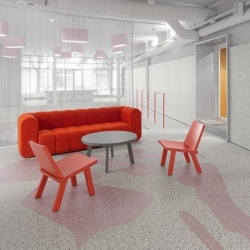To provide the best experiences, we use technologies like cookies to store and/or access device information. Consenting to these technologies will allow us to process data such as browsing behaviour or unique IDs on this site. Not consenting or withdrawing consent, may adversely affect certain features and functions.
The technical storage or access is strictly necessary for the legitimate purpose of enabling the use of a specific service explicitly requested by the subscriber or user, or for the sole purpose of carrying out the transmission of a communication over an electronic communications network.
The technical storage or access is necessary for the legitimate purpose of storing preferences that are not requested by the subscriber or user.
The technical storage or access that is used exclusively for statistical purposes.
The technical storage or access that is used exclusively for anonymous statistical purposes. Without a subpoena, voluntary compliance on the part of your Internet Service Provider, or additional records from a third party, information stored or retrieved for this purpose alone cannot usually be used to identify you.
The technical storage or access is required to create user profiles to send advertising, or to track the user on a website or across several websites for similar marketing purposes.
 The new UK Cities Climate Investment Commission begins work to identify Green Investment opportunities across UK Cities. Cities, investment and innovation experts have launched a Commission which begins the process of identifying a transformational programme of Green Growth for the UK’s cities. (more…)
The new UK Cities Climate Investment Commission begins work to identify Green Investment opportunities across UK Cities. Cities, investment and innovation experts have launched a Commission which begins the process of identifying a transformational programme of Green Growth for the UK’s cities. (more…)






 A new report from
A new report from 
 Taunton’s UK Hydrographic Office Headquarters was named ‘Best of the Best’ at the British Council for Offices’ (BCO) National Awards, and also took home the ‘Corporate Workplace’ award. The office was joined by six other award winners recognised as leading examples of excellence in the office space. This ‘roll of honour’ includes two buildings in London: The Brunel Building on Canalside Walk, and 160 Old Street, a refurbished office space in the “Silicon Roundabout” district.
Taunton’s UK Hydrographic Office Headquarters was named ‘Best of the Best’ at the British Council for Offices’ (BCO) National Awards, and also took home the ‘Corporate Workplace’ award. The office was joined by six other award winners recognised as leading examples of excellence in the office space. This ‘roll of honour’ includes two buildings in London: The Brunel Building on Canalside Walk, and 160 Old Street, a refurbished office space in the “Silicon Roundabout” district. 


 Recently launched is
Recently launched is 
 Increasing pressure from investors, customers and employees are causing CEOs to focus their businesses on purpose, resilience and long-term sustainability, according to a new report from the Reward & Employee Benefits Association (
Increasing pressure from investors, customers and employees are causing CEOs to focus their businesses on purpose, resilience and long-term sustainability, according to a new report from the Reward & Employee Benefits Association (
 The UK Green Building Council (UKGBC) has published its
The UK Green Building Council (UKGBC) has published its 
 A recent survey by
A recent survey by 
 WiredScore, is announcing the launch of a new certification for smart buildings aimed at providing clarity, definition and measurement for the growing smart building industry.
WiredScore, is announcing the launch of a new certification for smart buildings aimed at providing clarity, definition and measurement for the growing smart building industry. 
 New research by
New research by 


 A new report from KPMG suggests that half of major corporations do not expect to see a return to any sort of ‘normality’ until 2022 when half of the general population has been vaccinated. The report also claims that there has been a steep decline in the appetite of the global executives who took part in the survey for office downsizing as the firms reconsider the need for in-person business to resume when countries emerge from the pandemic.
A new report from KPMG suggests that half of major corporations do not expect to see a return to any sort of ‘normality’ until 2022 when half of the general population has been vaccinated. The report also claims that there has been a steep decline in the appetite of the global executives who took part in the survey for office downsizing as the firms reconsider the need for in-person business to resume when countries emerge from the pandemic. 






